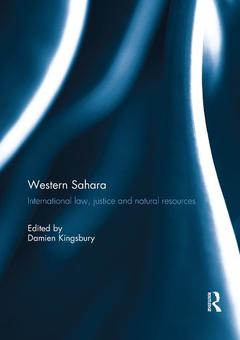Western Sahara International Law, Justice and Natural Resources

As the Spanish were preparing to leave colonized Western Sahara in 1975, Morocco invaded, sparking a war with the Western Saharan Polisario Front. About 70% of Western Sahara was occupied by Morocco, which stations up to 140,000 soldiers in the territory, primarily along a 1700 kilometre long sand berm that is protected by one of the world?s largest fields of landmines. In 1991, Morocco and the Polisario Front agreed to a truce ahead of a referendum on Western Sahara?s future. However, Morocco has since refused to allow the referendum to take place, and has begun the extensive exploitation of Western Sahara?s non-renewable natural resources. This has both highlighted the plight of the Saharawi people who live in refugee camps in Algeria and in occupied Western Sahara, and pushed the Polisario Front back to a position where it is openly canvassing for a return to war. This book was originally published as a special issue of Global Change, Peace and Security.
1. The role of resources in the resolution of the Western Sahara issue 2. The taking of the Sahara: the role of natural resources in the continuing occupation of Western Sahara 3. Western Sahara, resources, and international accountability 4. The status of Western Sahara as occupied territory under international humanitarian law and the exploitation of natural resources 5. The hidden cost of phosphate fertilizers: mapping multi-stakeholder supply chain risks and impacts from mine to fork 6.The role of natural resources in the building of an independent Western Sahara 7. Independence by fiat: a way out of the impasse – the self-determination of Western Sahara, with lessons from Timor-Leste 8. Saharawi conflict phosphates and the Australian dinner table
Damien Kingsbury holds a Personal Chair and is Professor of International Politics in the School of Humanities and Social Sciences at Deakin University, Melbourne, Australia. His research interests include assertions of self-determination, the role of the military in politics, post-colonial political structures, and nation formation. He is the author of Sri Lanka and the responsibility to protect: politics, ethnicity and genocide (2012), and East Timor: the price of liberty (2009).
Date de parution : 01-2018
17.4x24.6 cm
Date de parution : 03-2016
17.4x24.6 cm
Thèmes de Western Sahara :
Mots-clés :
Western Sahara; Saharawi People; Global Change; Peace and Security; Spanish Sahara; North Africa; East Timor; refugee camps; SADR; Occupied Western Sahara; non-renewable resources; Frente Polisario; referendum; International Humanitarian Law; occupation; WSRW; post-colonialism; Organized International Community; Polisario Front; Phosphate Rock; Morocco; UNGA Resolution; exploitation; EEZ; natural resources; Western Sahara Advisory Opinion; Non-self Governing Territories; Phosphate Rock Mining; Resolution Iii; Bu Craa; Keesings Contemporary Archives; Non-Self Governing Territory; Madrid Agreement; FMC Corp; Supply Chain Risks; Moroccan Settlers



